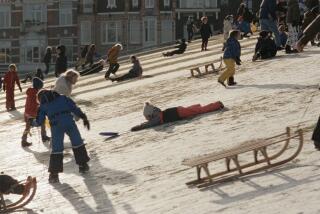Frits Philips, 100; Head of Electronics Company Helped Save Jews From Nazis
- Share via
Frits Philips, the former president of the Dutch electronics giant that bears his family name, who helped save hundreds of Jewish workers after Nazi occupiers forced him to open a workshop in a concentration camp in the Netherlands during World War II, has died. He was 100.
Philips, the last family member to lead the electronics group, died Monday of pneumonia and complications resulting from a fall at his estate in Eindhoven in the southeast Netherlands, the company announced.
His strategy in becoming an employer at the prison camp near Vught, about 20 miles north of company headquarters in Eindhoven, was deceptively simple.
Philips put as many Jews to work as possible and argued that they were indispensable, delaying their deportation to the Auschwitz death camp in Poland.
Of the 469 Jewish prisoners who helped make radio receivers and electric shavers for Germany, 382 survived the war, according to a company history.
In 1996, when he was awarded a Yad Vashem medal, given to Holocaust rescuers, Philips said that he was no hero and that many others had helped save lives.
Philips “showed extraordinary courage in the face of terrible circumstances,” the Yad Vashem memorial group told Reuters this week.
His personal drama escalated when thousands of workers at his factories went on strike in 1943. The Nazis imprisoned Philips and threatened to execute him unless his employees went back to work. They did, but Philips was detained for five months.
On entering the prison, Philips “felt as if the colossal weight of my responsibility was suddenly being lifted from me,” he wrote in his 1976 autobiography, “45 Years With Philips.”
Much later he realized that his “life had been that day hanging by a silken thread.”
The same May day that Philips was arrested, seven men -- including four in his employ -- were executed by the Germans at a company plant. For the rest of his life, Philips visited the yard to lay flowers where the men were murdered.
At 25, he had joined the family business and later played a key role in transforming it into a multinational electronics corporation. Philips spent more than 40 years at the company, including a decade at the helm beginning in 1961.
Under the leadership of “Mr. Frits,” as employees affectionately called him, revenue tripled, partly because of the sale of color television sets.
He also emphasized scientific research. The electronics group produced the first compact audiocassette player in the early 1960s. Work was also started on what would become the compact disc.
Today the enterprise, now called Royal Philips Electronics, is Europe’s leading electronics manufacturer, with annual sales of more than $35 billion and nearly 160,000 employees. It sells consumer electronics, lighting, semiconductors and medical technology.
Frederik Jacques Philips was born in Eindhoven on April 16, 1905, the only son of Anton Philips, who co-founded a lightbulb business in the early 1890s with his brother Gerard.
Frits Philips was raised to take his place at what the family called “the factory,” graduating with a degree in mechanical engineering in 1929 from the Technical University in Delft.
By the time Philips joined the business in 1930, it was also making medical X-ray tubes and radio valves and experimenting with television technology. Later in the decade, it introduced one of the first electric razors.
When Philips got word on May 9, 1940, that the Germans were going to invade the Netherlands the next day, he stayed behind while other family members fled to North America. A deeply religious 35-year-old, Philips wanted to protect his employees and prevent the family enterprise from aiding German occupiers.
During the war, the company deliberately manufactured faulty radio valves, hid its capacity to make weapons and tried to be as unproductive as possible.
Still, the firm was forced to make electrical equipment for the German army. It became one of the few Dutch targets for Allied bombers, and Philips factories were extensively damaged.
In July 1944, fearing that he was going to be deported to Germany, Philips escaped through a window just as German guards arrived at his office. He hid in friends’ attics until Eindhoven was liberated two months later.
In an attempt to flush Philips out of hiding, the Germans imprisoned his wife, Sylvia, in the Vught camp for several weeks.
From 1945 on, Philips oversaw reconstruction of the operation in the Netherlands and the expansion of the company in South America and Asia.
When he turned 100, the festivities received national television coverage in his country. Eindhoven renamed itself “Frits Philips City” for the day, and his beloved professional soccer team, founded in 1913 as a sports club for Philips employees, called itself “Frits.”
Sylvia Philips died in 1992. He is survived by three sons and three daughters; another daughter predeceased him.
More to Read
Inside the business of entertainment
The Wide Shot brings you news, analysis and insights on everything from streaming wars to production — and what it all means for the future.
You may occasionally receive promotional content from the Los Angeles Times.









